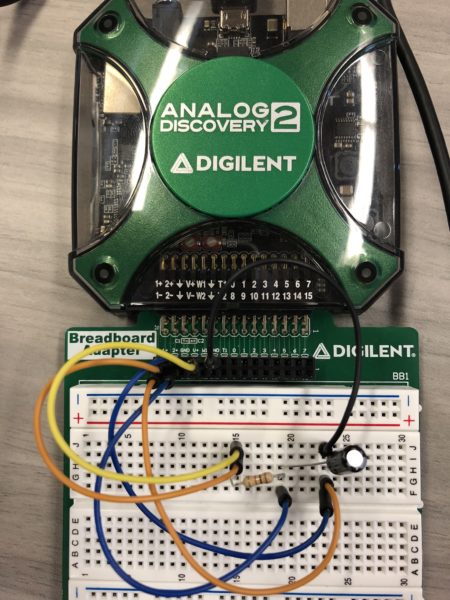Studies have shown that hands-on, experimental learning is vital to the success of students enrolled in college engineering courses. This has led to universities becoming increasingly concerned with finding ever-better ways to provide students with opportunities to engage in hands-on learning. Traditional on-campus laboratories are very helpful, but they can be limiting. Students must share equipment, and often find themselves part of a group in which not every student has the opportunity to actually get their hands on a device. Universities do their best to offer extended lab hours, but many students still find it impossible to get the hands-on time they need with lab equipment. Researchers continue to search for a solution to this problem, and in the research paper titled “Remote Circuit Design Labs with Analog Discovery,” three researchers examine the use of Digilent’s Analog Discovery as a means of increasing hands-on learning in two separate Circuits courses.
From the paper:
The Analog Discovery from Digilent is a small, portable circuit design station that lends itself perfectly to experimental learning. It has been shown that it is important for students to have opportunities to engage in hands-on, experimental learning early on in their college careers. Early exposure to this type of learning has been shown to increase student learning outcomes and student retention in engineering courses. Because of this, many universities are developing courses that will give freshmen ample opportunity for hands-on learning. In 2012, the Electronics Engineering Technology department at one university decided to use Digilent’s Analog Discovery in their Electrical Circuits I and II courses. These courses are unique because the only prerequisite is Pre-Calculus, making them accessible to first and second-year students.
Below is a list of topics covered in these two courses.
- Voltage and Current
- Resistance
- Ohm’s Law, Power, and Energy
- Series DC circuits
- Parallel DC circuits
- Network Theorems
- Capacitors, Inductors and Magnetic Circuits
- Sinusoidal Alternating Waveforms
- The Basic Elements and Phasors
- Series and Parallel AC circuits
- Network theorems AC circuits
- Power and Resonance
- Transformers
- Polyphase systems
Normally, students would only be able to perform the labs in these courses on campus, but with the help of the Analog Discovery, students can work on homework, and practice the skills associated with these labs from virtually anywhere. As it says in the paper, “The Digilent Analog Discovery design kit, developed in conjunction with Analog Devices Inc., is the first in a new line of all-in-one analog design kits that will enable students to quickly and easily experiment with advanced technologies and build and test real-world, functional analog design circuits anytime, anywhere – right on their PCs.” The Analog Discovery is a “low cost and portable test and measurement device, which provides various instruments including two oscilloscope probes, two arbitrary waveform generators, two power supplies, a voltmeter, a logic analyzer, and a pattern generator in a single module.” Every student needs their own Analog Discovery, and according to the paper, “an acquisition of a large number of these mobile Analog Discovery modules for an introductory class shall prove to be quite an ideal solution.”
Below is a list of labs conducted in both Electric Circuits courses, for which the Analog Discovery could be used:
In Electric Circuits I, the following labs are conducted:
- Series/Parallel DC circuits
- Superposition Theorem (DC)
- Thevenin’s and Norton’s Theorem
- RC, RL and RLC circuits
In Electric Circuits II the following labs are conducted:
- The Oscilloscope
- R-L-C components
- Frequency response of series RC, RL and RLC circuits
- Superposition Theorem (AC)
Last but not least, the flexibility of the Analog Discovery allows students to form a Student Lead Outreach Group (SLOG). There are two main purposes of a SLOG:
1. To disseminate Electronics Engineering Technology awareness to under-represented groups, local communities, precollege and postsecondary students, and teachers via outreach demonstration projects using the Analog Discovery kit.
2. To assist students who need help at any location 24/7.
With the Analog Discovery, Student Lead Outreach Groups will be able to bring experimental, hands-on learning to groups who would otherwise have no access to such information and valuable experience. It can even help increase high school students’ interest in engineering, and help prepare future engineering students for what lies ahead.

Overall, the Analog Discovery is an excellent addition to any Electrical Engineering Technology Program. Use of the Analog Discovery as a means of increasing hands-on learning and creating remote labs can lead to “higher matriculation rates, increased retention, and ultimately a higher graduation rate.” Both instructors and students were very pleased with the Analog Discovery as a means of supplementing the traditional on-campus lab experience. The Analog Discovery is portable, flexible, and affordable, making it an invaluable tool for both introductory, and upper division college courses.

